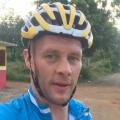LEAVING Jamaica was always going to be hard. I was returning to a cold and wet London with oncology looming over me as dark as the cloud over London itself.
When I stepped off the plane the cold hit my body and I could feel my spinal cord tightening.
A few days later, as I was giving a talk to a company in London on how to bounce back from life’s obstacles, I was thinking that my own biggest obstacle this week would be fighting the jet lag and trying to avoid any flu bugs lurking around.
Safely navigating through the weekend, everything was going so well. But when I was out at the shops, out of nowhere my legs gave way, and before I knew it I was on the floor again.
Funnily enough I was picked up off the floor from a Jamaican man.

This is life with a spinal cord injury. The tumour I can deal with as I only really have to face it at scans and one day every three months in hospital, but a spinal cord injury is something I am dealing with 24 hours a day, seven days a week.
There is no escape from it, because even when I sleep I am constantly waking up in pain, in need of the bathroom or after wetting the bed.
Yes, peeing the bed at 40 is all part of living with a spinal cord injury. So is falling in the street. The cold weather only makes things worse.
The way I think of it, everything below the injury is speaking Mongolian and everything above the injury is speaking English. This leads to falling over in the street and peeing the bed along with a whole host of other things that nothing can prepare you for.
Most of my story focuses on the tumour, but my real challenge is life with the spinal cord injury. I have probably struggled more with that lately than any thought of oncology, even more so knowing that the paralysis could have been prevented.
The research I have done into my condition tells me that two options could have prevented my paralysis. Neurological monitoring, a technique used during neurosurgery, to monitor
the spinal cord, would have made a difference, so would undergoing radiation treatment in 2014.
However, in life I believe in focusing on solutions not problems. Even though I spend some time each month researching and praying for someone to find a cure for spinal injury, I try to push on with life.
I know we were all reminded this week of how important that is after the death of Kobe Bryant – an incredible athlete and someone who transcended sport to inspire people all over the world.
Over the last few weeks I have focused on helping Marloe Rodman, who has the chance to become the first Jamaican para cyclist, and setting up the first ever para cycling team in Jamaica, so when the world track championships unfold in Canada I know I won’t be racing this year for either GB OR Jamaica.
Unfortunately, getting the paperwork sorted takes longer than I was hoping, but that doesn’t mean I won’t be racing. I am hoping to go with Marloe to some races to help him. When I called him this week he said his friend had just been shot and died, and here is me feeling frustrated about my legs.
I have learned again this week through both Kobe and Marloe that being grateful for what we have is one of the most important lessons we will ever learn.
It is hard to remind myself
of that as I lie on my bed feeling frustrated after
falling over and unable to
train again because my legs aren’t working and my back
is killing me.
So just as I was thinking what can I aim for on my
bike, my good friend Steffen called me with what first seemed like a great idea till
it sank in.
By the time the fear hit me Steffen had us entered as a two-man team in the Tour Trans Alps, a 800km stage race over seven days crossing 18,000ft of the Alps which has a 1000 athletes entered from 35 nations.
It is similar to the Grandes des Alpes ride I did before my last surgery in 2018 which was both incredible and one of the hardest weeks I have ever had on a bike.
This time around this ride is more of a race and more challenging as, since that ride in 2018, I have had two more surgeries plus radiotherapy. And it is in June, which
means I don’t have much
time to train.
I contacted the organisers to ask about the race part as much as I would love to be up there with the top guys, but realistically just finishing this is going to be a real test. My main aim will be to just keep the pedals turning long enough to get to the finish line.






Comments & Moderation
Readers’ comments: You are personally liable for the content of any comments you upload to this website, so please act responsibly. We do not pre-moderate or monitor readers’ comments appearing on our websites, but we do post-moderate in response to complaints we receive or otherwise when a potential problem comes to our attention. You can make a complaint by using the ‘report this post’ link . We may then apply our discretion under the user terms to amend or delete comments.
Post moderation is undertaken full-time 9am-6pm on weekdays, and on a part-time basis outwith those hours.
Read the rules here